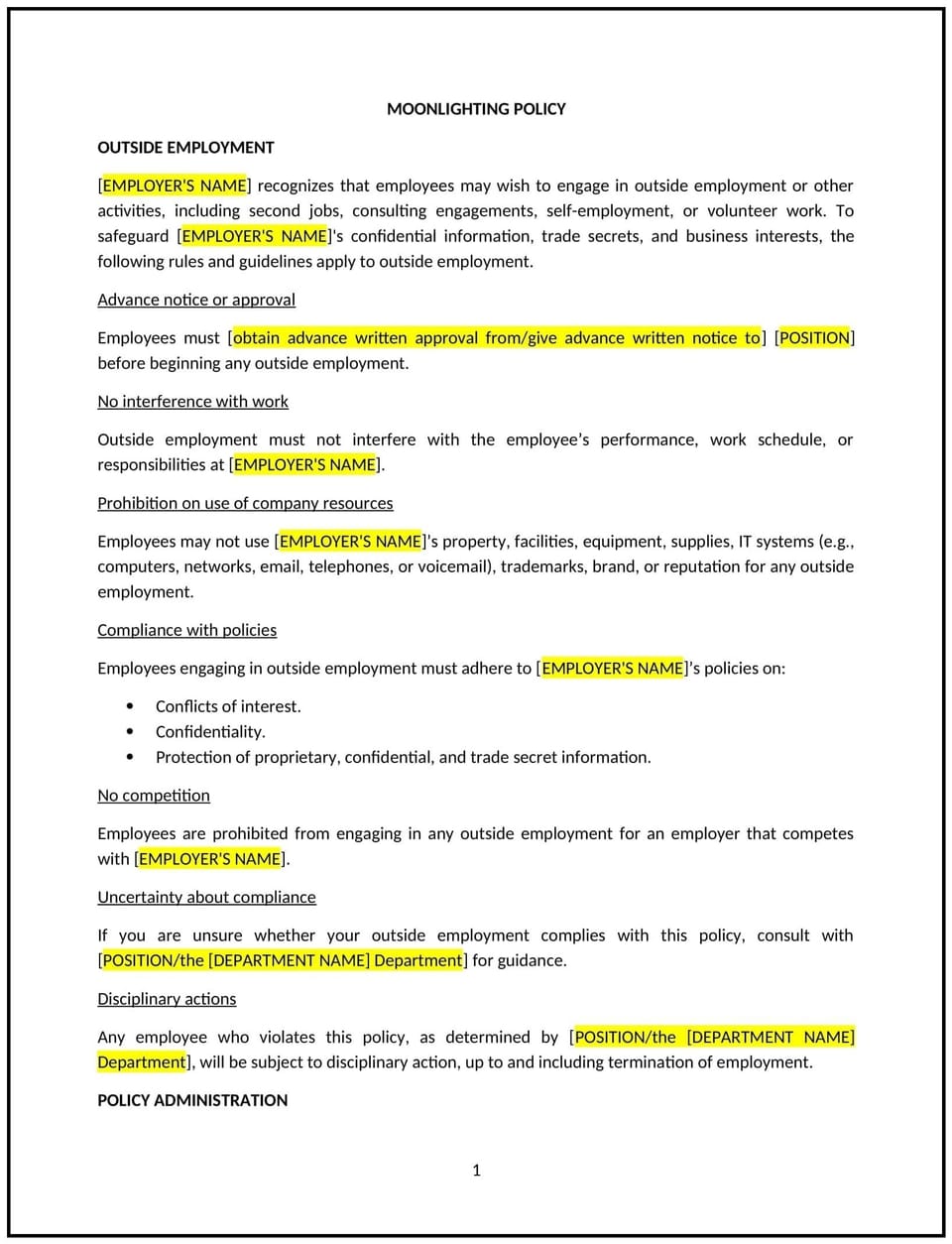Moonlighting policy (Connecticut): Free template

Moonlighting policy (Connecticut)
A moonlighting policy helps Connecticut businesses address the issue of employees working secondary jobs outside their regular employment. This policy outlines the company’s stance on outside employment, including any restrictions or approval processes, to ensure that employees' secondary work does not interfere with their primary job responsibilities, create conflicts of interest, or compromise the company’s interests.
By implementing this policy, businesses can manage potential risks related to outside employment, while supporting employees' ability to pursue additional income opportunities in a balanced and fair manner.
How to use this moonlighting policy (Connecticut)
- Define moonlighting: Clearly explain what constitutes moonlighting (secondary employment) and specify the conditions under which employees are allowed to engage in outside work.
- Set approval procedures: Establish a process for employees to disclose any secondary jobs and request approval if necessary, ensuring transparency and mitigating conflicts of interest.
- Address conflicts of interest: Outline any restrictions on outside employment that could create a conflict of interest, such as working for a direct competitor or engaging in activities that could harm the company’s reputation or trade secrets.
- Ensure performance standards: Make it clear that moonlighting should not interfere with the employee's performance, availability, or commitment to their primary job responsibilities.
- Maintain confidentiality: Require employees to keep company information confidential, and ensure that outside employment does not involve the misuse of proprietary information or intellectual property.
- Provide guidelines for secondary work: If secondary jobs are permitted, specify guidelines around the types of work employees may engage in and any limitations on hours worked.
Benefits of using this moonlighting policy (Connecticut)
This policy offers several benefits for Connecticut businesses:
- Protects company interests: By addressing potential conflicts of interest, the policy ensures that employees’ secondary employment does not harm the business or its competitive edge.
- Maintains employee performance: Ensures that employees' moonlighting activities do not interfere with their primary job responsibilities, ensuring that work quality and productivity are not compromised.
- Supports transparency: Provides a clear framework for employees to disclose and seek approval for secondary jobs, fostering open communication and trust within the organization.
- Reduces legal risks: Helps the business mitigate risks related to intellectual property misuse, competition, and employee performance issues stemming from outside employment.
- Encourages work-life balance: Acknowledges the reality that employees may need or want additional income, while ensuring that their secondary work does not negatively affect their well-being or job performance.
Tips for using this moonlighting policy (Connecticut)
- Communicate the policy clearly: Ensure that all employees understand the guidelines for outside employment and the process for requesting approval, particularly those who may be considering additional jobs.
- Provide training for managers: Equip managers with the tools to handle moonlighting requests and identify potential conflicts of interest early.
- Monitor compliance: Regularly review employee requests for secondary employment and any conflicts of interest to ensure adherence to the policy.
- Be flexible but firm: While acknowledging employees' right to seek additional income, make it clear that the company’s interests must come first, and any outside work that negatively impacts performance will not be tolerated.
- Review periodically: Update the policy regularly to reflect changes in business needs, industry standards, or legal requirements to ensure its continued effectiveness.
Q: How does this policy benefit my business?
A: The policy helps protect the company’s interests by ensuring that employees’ secondary employment does not create conflicts of interest, affect their job performance, or jeopardize company confidentiality. It also fosters transparency and open communication.
Q: What types of secondary employment are not allowed?
A: Secondary employment that directly competes with the company, involves disclosing confidential information, or negatively affects the employee's performance or availability is generally prohibited. The policy should specify any activities that are restricted.
Q: Do employees need to get approval for outside jobs?
A: Yes, employees should disclose any secondary employment and seek approval from their supervisor or HR. The approval process ensures that there are no conflicts of interest and that performance standards are met.
Q: Can employees work for a competitor outside of regular hours?
A: Typically, employees are prohibited from working for a direct competitor to avoid conflicts of interest, misuse of proprietary information, or other risks. This restriction should be outlined in the policy to ensure clear boundaries.
Q: How often should this policy be reviewed?
A: The policy should be reviewed annually or whenever there are updates to Connecticut laws, changes in business operations, or employee feedback to ensure it remains relevant, effective, and legally compliant.
This article contains general legal information and does not contain legal advice. Cobrief is not a law firm or a substitute for an attorney or law firm. The law is complex and changes often. For legal advice, please ask a lawyer.


